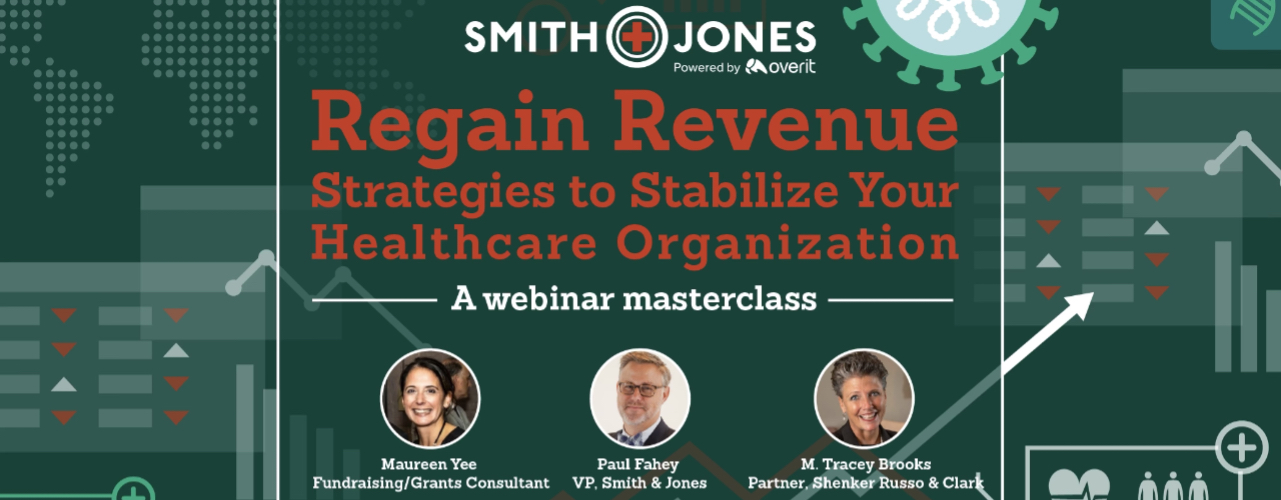Strategies to Stabilize and Regain Revenue in Healthcare – Recap
As 2020 (finally) draws to a close, healthcare professionals are left to reckon will the fallout from the pandemic. One of the major concerns for hospitals and health systems is the loss of revenue whilst money-making elective procedures were put on pause to accommodate COVID patients and keep everyone safe.
We recently hosted a webinar featuring three interesting perspectives that all need to work together to help regain revenue in 2021: marketing, fundraising and government affairs. Smith & Jones VP Paul Fahey chatted with Maureen Yee, an experienced not-for-profit leader and M. Tracey Brooks, a government affairs attorney and partner at Shenker, Russo & Clark.
We’ll embed the full webinar at the bottom of this post, but for a high-level overview, keep reading!
The number one takeaway across all three of these tactics is to keep up communications.
- With your patients: Don’t chase the consumer and attempt to pressure them to get back to scheduling in-office appointments and procedures as soon as humanly possible. They might not be ready, and that’s okay. But that doesn’t mean you should just disappear. Continue communicating and building the relationship through multiple channels like email and social to remind them that when they’re ready, you’re ready. For your mass media marketing, use broad brand or staff focused messaging to remind community members you’re here, doing your part to help fight COVID, and you’ll still be here after things get better.
- With your donors: One positive that has come from the pandemic is many people actively WANT to give money directly to healthcare organizations to help fight COVID. And with the stock market doing well, they likely are able to get and move funds quickly, which is huge. Make sure you’re talking to your major donors about any strategic changes you might be planning (or even just thinking about), since they are invested, and will be able to move money the fastest.
- With foundations: Even if you can’t pursue a certain grant, keep up communications with foundations. They’re trying to be flexible as they can. But even if you think it wouldn’t be a good fit, there’s no harm in reaching out and asking, “Who might be able to help me?” This will keep the foundation up to date with your future plans, and they might be able to connect you with someone who can help with your more immediate needs.
- With your government and elected officials: Yes, government is busy. Yes, there is a deficit. But Tracy emphasized “It’s always worth talking to government. Even when it’s difficult.” Let them know what the state of your organization is. Keep them up to date with your immediate needs and future plans. It’s also important and advantageous to reach out to and welcome newly elected officials so you can begin to establish that relationship even before they officially take office.
Tracy reminded us, “We’re only limited by our imagination. A crisis is an opportunity to be creative.” Healthcare is not nimble, but being nimble and creative – By working with all these different facets, will help plans move through the government faster. Paul added that now is the time to reevaluate the things you’ve simply “always done” (like large events and galas) and find more cost-effective ways to achieve your goals. Every industry has had to innovate during the pandemic, and healthcare is no different.

